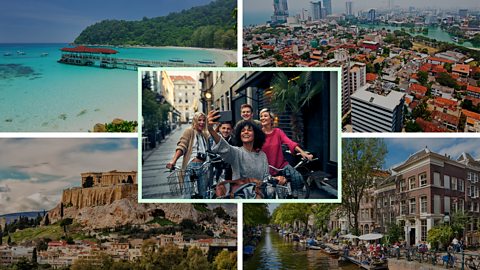
Welcome to The Regenerators.

For 15 years, Edwin Congreave lived the sort of rock ‘n’ roll lifestyle that many a bedroom musician dreams about.
The keyboard player with the band Foals, his life was a hubbub of international touring, album launches, live gigs and award ceremonies.
Then, it all stopped. In September 2021, the group posted on their Instagram account that Edwin had performed his last gig with them and was stepping down. He was going solo, but not musically. Instead, he was going back to college, as part of his passion to do something positive about climate change.
Now, he’s sharing his story with The Regenerators - about why he’s studying economics at the University of Cambridge and the ways he believes bands can make touring more sustainable in future.
Switching from the stage to studying
It was while he was on tour with the band that Edwin started reading more about the climate crisis and its implications.
He explained: “It changed my world view. It was that kind of tour where it was very carbon-intensive, lots of flying. I felt very bad about myself.”

After reading more about what could happen in the next 100 years regarding changes in sea level, our air quality and the increasing risk of wildfires, Edwin felt compelled to do something about it.
“I felt that in my mid-20s to early 30s, I’d maxed out my carbon footprint,” he said. “I’d taken so many flights, used a lot of energy… the way I felt was that, if in my 50s or 60s I have grandchildren and they say, ‘what were you doing?’, if I were to say, ‘I was flying business class across the Pacific on a monthly basis’, I wouldn’t feel comfortable with that.”
What connects economics and sustainability?
It may not seem obvious to non-experts how economics can make the planet a better place to live, but Edwin was happy to explain. It involves the steps governments might want to take on certain issues, while investigating the impact on factors such as the economy and people’s way of life.
Using fossil fuels as an example, he said: “The way we dial down the use of carbon is an enormously complicated question and that’s where economics comes in. You have models and forecasts. You take in data and make predictions.”
How can bands make touring more sustainable?
The question of how bands with an international fanbase can tour without leaving behind a large carbon footprint is something the music industry is looking to answer - and something of great interest to Edwin.
Bristol band Massive Attack worked with the University of Manchester on a study of the level of carbon emissions created by musicians taking their sounds out on the road. The group Coldplay has also expressed a commitment to cutting the carbon emissions of their planned 2022 tour to half of that made by their one in 2016/17.

Edwin believes that one of the key factors to make sustainable touring work is greener transport.
He said: “If you tour the UK, you could feasibly do it by train but you still need to move your gear around and, at the moment, electric trucks [as in long-haul, heavy freight vehicles] don’t exist [on a large scale]. When they do, it will be a game-changer.”
Bands often fly between countries on major tours and the aviation industry has been looking at greener fuels and ways to cut down on The water vapour that condenses as ice onto the soot particles from aircraft engines., among other concerns. However, it is currently a challenge to fly in a way that can be considered eco-friendly.
Tips on touring in eco-friendly fashion
While having a fleet of electric trucks isn’t a possibility just yet, progress is being made. In the spring of 2021, it was reported that faster battery charging (rather than using bigger batteries to power heavy trucks) may be one way around the problem, but the technology needs work. Another scheme is investigating the possibility of overhead cables powering electric lorries on stretches of motorway.
While science works on the issue, there are still things Edwin believes bands can do to get out there and connect with their fanbase in a more planet-friendly way.

He added: “Bands can choose to plays festivals that are more ‘eco-conscious’, there’s lots of them in Europe now.”
One example of this is Terraforma in Milan, Italy, where festivalgoers work on restoring the site while they are there, as well as enjoying the live music. Closer to home, it’s been possible for people to use pedal power to charge their mobile phones at Glastonbury for more than 10 years.
Edwin continued: “Bands can also route tours more efficiently, by not zig-zagging between locations for example. That’s true for van and bus tours as well as for flying. They can also carry less freight equipment around the world.”
You don’t have to be in a band to make a difference
Away from the music world, there are still changes people can make to their everyday lives which can help the environment.
He suggested that switching to a meat and dairy-free lifestyle can make a big difference. Animal-based food tends to have a higher carbon footprint than plant-based and a 2018 study showed how more than half of the world's food emissions comes from animal products. Cutting out meat isn't a choice for everyone, but there are still ways to make it more sustainable. The Committee on Climate Change says greenhouse gas emissions from beef produced in the UK is around half of the global average.
Perhaps the biggest difference for Edwin is his new level of travelling. He’s firmly London-based now, with the benefits of its public transport system - and he also has use of an electric car.
Edwin moved his hands far apart to prove one further point. As he spoke, he brought his hands back together, so close that they were almost touching.
“My carbon footprint has gone from this, “ he smiled, “to this.”
Make a difference
Discover more about the planet and how to protect it with the BBC.
How to use your voice to make a difference
THE REGENERATORS

Quiz: Can you travel without costing the earth?
THE REGENERATORS

Quiz: Can you guess the green celebrities?
THE REGENERATORS

Back to The Regenerators
BBC BITESIZE
